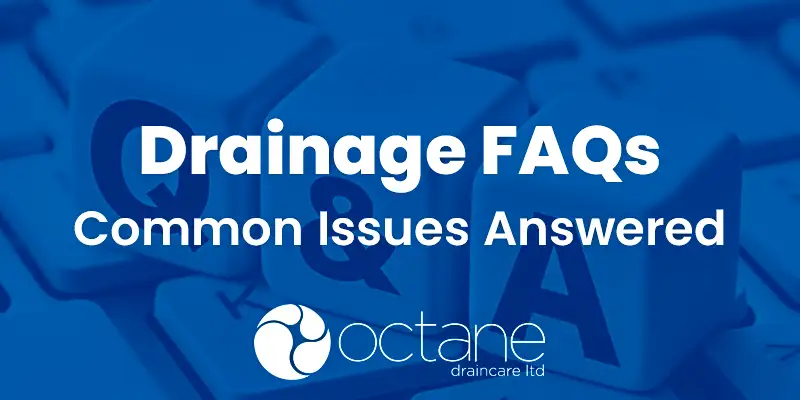Draincare Frequently Asked Questions (FAQs)
How do I know if my drains are blocked?
Common signs of a blocked drain and drainage problems include slow-draining sinks or toilets, unpleasant odours, gurgling sounds from pipes, and water backing up into appliances. You may also notice patches of standing water outside your property. If these symptoms appear, it is important to act quickly by calling a professional drainage company like Octane Draincare to prevent damage to your system.
What causes drains to block or drain slowly?
Blockages are usually caused by a build-up of fats, oils, grease, hair, food waste, soap residue, and non-flushable items such as wipes. In outdoor drains, tree root ingress and debris such as soil or leaves can also cause slow drainage. Our CCTV drain surveys allow us to identify the cause precisely, and our high-pressure jetting equipment clears blockages effectively.
Do I really need regular drain maintenance?
Yes. Routine drain maintenance and inspections help prevent emergency call-outs, expensive repairs and further drainage problems. For commercial, industrial, and public sector sites, regular checks are often a legal requirement to meet environmental standards. Octane Draincare offers planned preventative maintenance contracts to keep your drainage system working efficiently and compliant all year round.
What services does Octane Draincare provide?
We deliver a wide range of professional drainage services, including:
- CCTV drain surveys to identify faults
- High-pressure water jetting for stubborn blockages
- Drain repairs and trenchless relining
- Septic tank emptying and maintenance
- Interceptor cleaning and maintenance
- Planned and reactive drainage maintenance
How can I prevent future drain clogs?
To reduce the risk of blockages, avoid flushing wipes, sanitary products, and cotton buds. Do not pour fat, oil, grease, coffee grounds, or food waste down your drains. Fitting strainers on sinks and showers helps catch debris like hair. For complete protection, Octane offers routine jetting and inspections that keep your system running smoothly.
How often should drains be professionally cleaned?
For commercial and industrial sites, we recommend a CCTV inspection or jetting service every 6–12 months, depending on usage. Domestic properties may need less frequent cleaning, but if you notice slow drainage or smells, professional cleaning will help maintain flow and prevent blockages.
Can a drain blockage be fixed without digging?
Yes. Many drainage problems can be repaired with non-invasive methods such as patch lining or trenchless relining. These techniques repair damaged pipes from the inside, avoiding the disruption and cost of excavation. Octane Draincare uses state-of-the-art relining systems to restore drains quickly and with minimal disruption.
How long does a CCTV drain survey take?
Most CCTV surveys take between three to four hours, depending on the size of your drainage system and access points. Following the survey, we provide a detailed report with video evidence, a condition assessment, and recommended solutions for any issues detected.
What should I do if multiple drains are slow?
If several drains in your property are draining slowly at the same time, this usually indicates a main sewer or external drainage problem rather than a localised blockage. Contact Octane Draincare immediately to carry out a survey and clearance, as leaving the problem can cause flooding and serious property damage.
Who is responsible for blocked drains?
In most cases, you are responsible for drains located within the boundary of your property. If the blockage is in a shared or public sewer, your local water authority or council is usually responsible. Octane Draincare can help identify where the issue lies and liaise with the relevant authority if needed.
Need expert draincare support?
Don’t wait for a small issue to turn into a costly emergency. Contact Octane Draincare today for CCTV surveys, jetting, repairs, and preventative maintenance.

